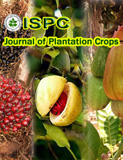Isolation, characterization and antagonistic efficacy of fungal endosymbionts from allied genera of cardamom
DOI:
https://doi.org/10.25081/jpc.2018.v46.i1.3527Abstract
Small cardamom (Elettaria cardamomum Maton) is a major spice crop cultivated for its economic, culinary and medicinal values.
Rhizome/clump rot, caused by Pythium vexans, Fusarium oxysporum and Rhizoctonia solani, is one of the destructive fungal diseases
accounting to 30 per cent crop loss. Deployment of beneficial microbes possessing growth promotion activity and antagonistic potential
against pathogens could be a viable and sustainable approach to nullify the deleterious effects of synthetic molecules on nature and
to control the disease effectively. In this study, an effort was made to isolate the endosymbiotic fungi associated with allied genera of
cardamom and evaluating their antagonistic efficacy under in vitro conditions against the rhizome rot pathogens. Among the endophytic
fungi isolated, maximum inhibition of P. vexans was noticed in AsuL4 with 72.4 per cent, followed by HcoL1 with 60.3 per cent, while
AmeR2 recorded maximum inhibition 65.3 per cent over control against R. solani followed by HcoL1 with 55.1 per cent inhibition.
Among the 17 isolates tested against F. oxysporum, endophytes isolated from Amomum subulatum, AsuLV3 recorded maximum
inhibition of 73.8 per cent followed by AsuL4 with 69.9 per cent. The shortlisted efficacious isolates need to be further evaluated
under glasshouse and field conditions to confirm their efficacy and could be employed as integral components in cardamom production
system to manage rhizome-root rot efficiently, economically and eco-friendly in a sustainable manner.







 .
.